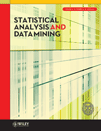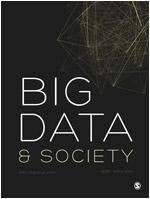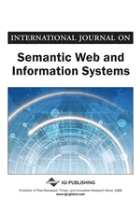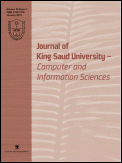
Wiley Interdisciplinary Reviews-Data Mining and Knowledge Discovery
Scope & Guideline
Empowering researchers to discover knowledge through data.
Introduction
Aims and Scopes
- Interdisciplinary Applications of Data Mining:
The journal emphasizes the application of data mining techniques across diverse fields such as healthcare, finance, and social sciences, showcasing how these methods can provide insights and solutions tailored to specific domains. - Innovative Methodologies and Techniques:
A core focus is on advancing and reviewing new methodologies in data mining, including machine learning, deep learning, and artificial intelligence, highlighting their effectiveness and potential impacts. - Knowledge Discovery Processes:
The journal explores the process of knowledge discovery from data, including methods for data preprocessing, pattern recognition, and the interpretation of results, contributing to better understanding and utilization of data. - Ethical and Privacy Considerations:
There is a consistent focus on the ethical implications and privacy concerns associated with data mining practices, especially in sensitive areas such as healthcare and personal data. - Emerging Technologies:
The journal is dedicated to exploring emerging technologies related to data mining, such as blockchain, digital twins, and quantum computing, reflecting the evolving landscape of data science.
Trending and Emerging
- Integration of AI and Machine Learning:
There is a growing emphasis on the integration of artificial intelligence and machine learning techniques in data mining applications, demonstrating their effectiveness in various fields such as healthcare, finance, and environmental science. - Healthcare Applications:
The trend of applying data mining techniques to healthcare continues to rise, with numerous studies focusing on improving patient outcomes, predictive modeling for diseases, and the use of digital health technologies. - Explainable AI (XAI):
The relevance of explainable AI is increasingly recognized, with a focus on developing methodologies that enhance the interpretability of machine learning models, especially in critical fields like healthcare and finance. - Ethical AI and Privacy Preservation:
Emerging themes around ethical AI practices and privacy-preserving data mining techniques are gaining traction, reflecting the growing concern over data privacy and ethical implications in data science. - Interdisciplinary Research:
There is a noticeable trend towards interdisciplinary research that combines data mining with fields such as social sciences, environmental studies, and engineering, highlighting the versatile applications of data mining methodologies.
Declining or Waning
- Traditional Statistical Methods:
There has been a notable decrease in the focus on conventional statistical techniques for data analysis, as newer, more sophisticated machine learning and AI methodologies gain traction. - Basic Data Mining Concepts:
Basic concepts of data mining, such as simple classification and clustering techniques, appear less frequently as the field moves towards more complex and integrated approaches. - Single-Domain Studies:
Research that focuses exclusively on single-domain applications without interdisciplinary perspectives is becoming less common, as the journal emphasizes cross-domain applications and methodologies. - Descriptive Analytics:
There is a waning interest in purely descriptive analytics, with a shift towards predictive and prescriptive analytics that leverage advanced algorithms and machine learning techniques.
Similar Journals

Machine Learning and Knowledge Extraction
Exploring the Frontiers of AI and EngineeringMachine Learning and Knowledge Extraction, published by MDPI, is an esteemed Open Access journal that has been at the forefront of disseminating cutting-edge research since its inception in 2019. Based in Switzerland, this journal has established itself as a significant contributor to the fields of Artificial Intelligence and Engineering, currently ranking in the Q2 category in Artificial Intelligence and Q1 in Engineering (miscellaneous) for 2023. With a notable Scopus ranking, it holds the 35th position out of 204 in Engineering, placing it in the 83rd percentile, while it ranks 127th out of 350 in Computer Science, reaching the 63rd percentile. Machine Learning and Knowledge Extraction serves as a vital platform for researchers, professionals, and students alike, promoting insightful discussions, innovative methodologies, and profound discoveries in machine learning and data extraction techniques. The journal's open access model ensures that groundbreaking research is widely accessible, fostering collaboration and advancing knowledge across various disciplines.

KNOWLEDGE AND INFORMATION SYSTEMS
Transforming Ideas into Impactful SolutionsKNOWLEDGE AND INFORMATION SYSTEMS, published by SPRINGER LONDON LTD, is a distinguished journal in the field of information systems, artificial intelligence, and human-computer interaction. With its ISSN 0219-1377 and E-ISSN 0219-3116, this journal has built a robust reputation since its inception, featuring a convergence of valuable research from 2005 through 2024. Catering to a diverse academic audience, it is classified among the leading journals in its category, proudly holding a Q1 ranking in Information Systems and Q2 rankings in multiple other domains. The journal aims to publish cutting-edge research that not only advances theoretical understanding but also provides practical applications within these rapidly evolving fields. Although it is not an Open Access journal, subscribers can access a wealth of knowledge critical for researchers, practitioners, and students looking to enhance their expertise. With a 2023 Scopus rank placing it within the 66th percentile for Information Systems, KNOWLEDGE AND INFORMATION SYSTEMS is an invaluable resource for those committed to pushing the frontiers of knowledge in technology and information science.

JOURNAL OF EXPERIMENTAL & THEORETICAL ARTIFICIAL INTELLIGENCE
Fostering Rigor in AI Research and ApplicationsThe Journal of Experimental & Theoretical Artificial Intelligence, published by Taylor & Francis Ltd, serves as a premier platform for researchers and professionals interested in advancing the fields of artificial intelligence, software engineering, and theoretical computer science. Established in 1989, this peer-reviewed journal features original research and comprehensive reviews that explore innovative methodologies and emerging trends within these dynamic domains. With an impact factor that reflects its relevance, the journal currently ranks in Q3 across its categories, affirming its contributions to the scholarly community. The journal's commitment to quality and rigor invites submissions that bridge experimental and theoretical frameworks, thus fostering a deeper understanding of AI's applications and implications. Researchers and students can access insightful articles that drive critical discussions and inspire future work, making this journal an essential resource for anyone looking to delve into the complexities of artificial intelligence and its surrounding disciplines.

Statistical Analysis and Data Mining
Harnessing Data for Groundbreaking ResearchStatistical Analysis and Data Mining is a leading journal published by WILEY, dedicated to exploring the latest advancements in statistical methods and data mining techniques. With an ISSN of 1932-1864 and an E-ISSN of 1932-1872, this journal serves as a significant platform for researchers and professionals in statistical analysis, computer science applications, and information systems. Covering a wide range of topics from innovative analytical methodologies to emerging data mining algorithms, the journal aims to disseminate high-quality research that contributes to the evolving landscape of data science. Ranked in the Q2 category for the fields of Analysis, Computer Science Applications, and Information Systems in 2023, it emphasizes its relevance and impact within academia. While it offers limited Open Access options, the insights shared in this publication are integral for those wishing to stay ahead in fast-paced research and data-driven industries. Since its inception in 2008 and continuing through 2024, Statistical Analysis and Data Mining invites submissions that reflect rigorous empirical research coupled with practical implications, making it a vital resource for the academic community.

Big Data & Society
Exploring the Nexus of Data and SocietyBig Data & Society is a premier open-access journal published by SAGE Publications Inc, first established in 2014 in the United Kingdom. This influential journal has rapidly become a cornerstone in the landscape of big data research, with an impressive impact demonstrated by its Q1 ranking across various fields, including Communication, Computer Science Applications, Information Systems, and Library and Information Sciences. With its focus on the critical intersections between data analytics and societal implications, Big Data & Society serves as an essential platform for scholars, professionals, and students to disseminate cutting-edge research and foster discussion in these dynamic and impactful domains. Researchers benefit from its rigorous peer-review process and robust visibility, as evidenced by Scopus rankings placing it in the top percentiles across multiple categories. By upholding open-access principles, the journal ensures that scholarly work is readily available, facilitating broader engagement and knowledge transfer within the academic community and beyond.

International Journal on Semantic Web and Information Systems
Transforming Information Systems Through Rigorous Research.International Journal on Semantic Web and Information Systems, published by IGI Global, stands as a premier outlet for research in the realm of Semantic Web technologies and information systems. With a commitment to advancing knowledge and innovation, the journal is recognized for its influential contributions, evident from its prestigious Q1 rankings in both Computer Networks and Communications and Information Systems categories as of 2023. Catering to the high demands of the academic community, the journal provides a platform for interdisciplinary dialogue, showcasing cutting-edge research, methodologies, and applications that underpin the evolving landscape of information systems. Researchers and professionals can stay informed about the latest trends, best practices, and transformative technologies shaping the Semantic Web. Although it does not offer open access, the journal maintains rigorous peer-review standards to ensure quality and relevance, making it an essential resource for anyone dedicated to pushing the boundaries of knowledge in this dynamic field.

Big Data and Cognitive Computing
Exploring the Intersection of Data and Intelligence.Big Data and Cognitive Computing is a premier open-access journal published by MDPI, dedicated to advancing research in the dynamic fields of artificial intelligence, computer science, information systems, and management information systems. Since its inception in 2017, the journal has established a significant presence, reflected in its impressive categorization within the Q2 quartiles for multiple disciplines in the 2023 rankings. Situated in Switzerland, the journal provides a vital platform for researchers, professionals, and students to publish groundbreaking work and access high-quality articles, enhancing the exploration of big data applications powered by cognitive computing. With an increasing global emphasis on data-driven decision-making, Big Data and Cognitive Computing offers unrestricted access to innovative research findings, addressing both theoretical and practical aspects. The journal's contributions are integral for those looking to stay at the forefront of technological advancements and their implications across various sectors.

Big Data Mining and Analytics
Advancing Knowledge Through Data InnovationBig Data Mining and Analytics, published by TSINGHUA UNIVERSITY PRESS, stands at the forefront of interdisciplinary research in the fields of Artificial Intelligence, Computer Networks and Communications, Computer Science Applications, and Information Systems. With an impressive Q1 ranking in multiple categories as of 2023, this journal serves as a critical platform for researchers and professionals eager to explore innovative techniques and methodologies related to big data analytics. Since its transition to Open Access in 2018, Big Data Mining and Analytics has aimed to increase the visibility and accessibility of its cutting-edge research, making permanent strides in the global academic landscape. Housed in Beijing, China, and actively embracing the converged years from 2018 to 2024, the journal aims to cultivate a rich discourse on emerging trends and applications, ensuring its relevance in a rapidly evolving technological environment. Join a vibrant community of scholars dedicated to advancing the frontiers of knowledge in big data.

Journal of King Saud University-Computer and Information Sciences
Pioneering Research for a Digital TomorrowJournal of King Saud University-Computer and Information Sciences, published by ELSEVIER, is a prestigious open-access journal focusing on the rapidly evolving fields of computer science and information technology. Since its inception in 1996, this journal has provided a platform for high-quality research and innovative ideas, promoting the dissemination of knowledge to a global audience. With a remarkable impact factor and ranked Q1 in the Computer Science (miscellaneous) category as of 2023, it stands among the top 11% of journals in its field, reflecting its commitment to excellence and relevance. The journal proudly carries the ISSN 1319-1578 and E-ISSN 2213-1248, and it is based in Saudi Arabia while being part of a global academic network. With a Scopus rank of #26 out of 232 in general computer science, the Journal of King Saud University-Computer and Information Sciences is an essential resource for researchers, professionals, and students seeking to stay at the forefront of technological advancement. As it continues to thrive through 2024, it invites contributions that will shape the future of computing and information sciences.

Journal of Information Assurance and Security
Navigating the Complexities of Cybersecurity.Journal of Information Assurance and Security, an esteemed publication by DYNAMIC PUBLISHERS, INC, serves as a pivotal platform for the dissemination of innovative research and insights in the field of information security and assurance. With its ISSN 1554-1010 and E-ISSN 1554-1029, this journal addresses critical vulnerabilities, emerging technologies, and methodologies that fortify data integrity and uphold privacy in our increasingly digital world. Although specific metrics such as the HIndex and Scopus ranks are currently unavailable, the journal is recognized for its contributions to both academia and industry, fostering collaboration among researchers, professionals, and students dedicated to advancing security protocols. The journal does not currently offer open access but ensures comprehensive accessibility through institutional subscriptions. As cybersecurity continues to be a paramount concern globally, the Journal of Information Assurance and Security stands out as an essential resource for groundbreaking studies and practical applications that drive the future of information protection.